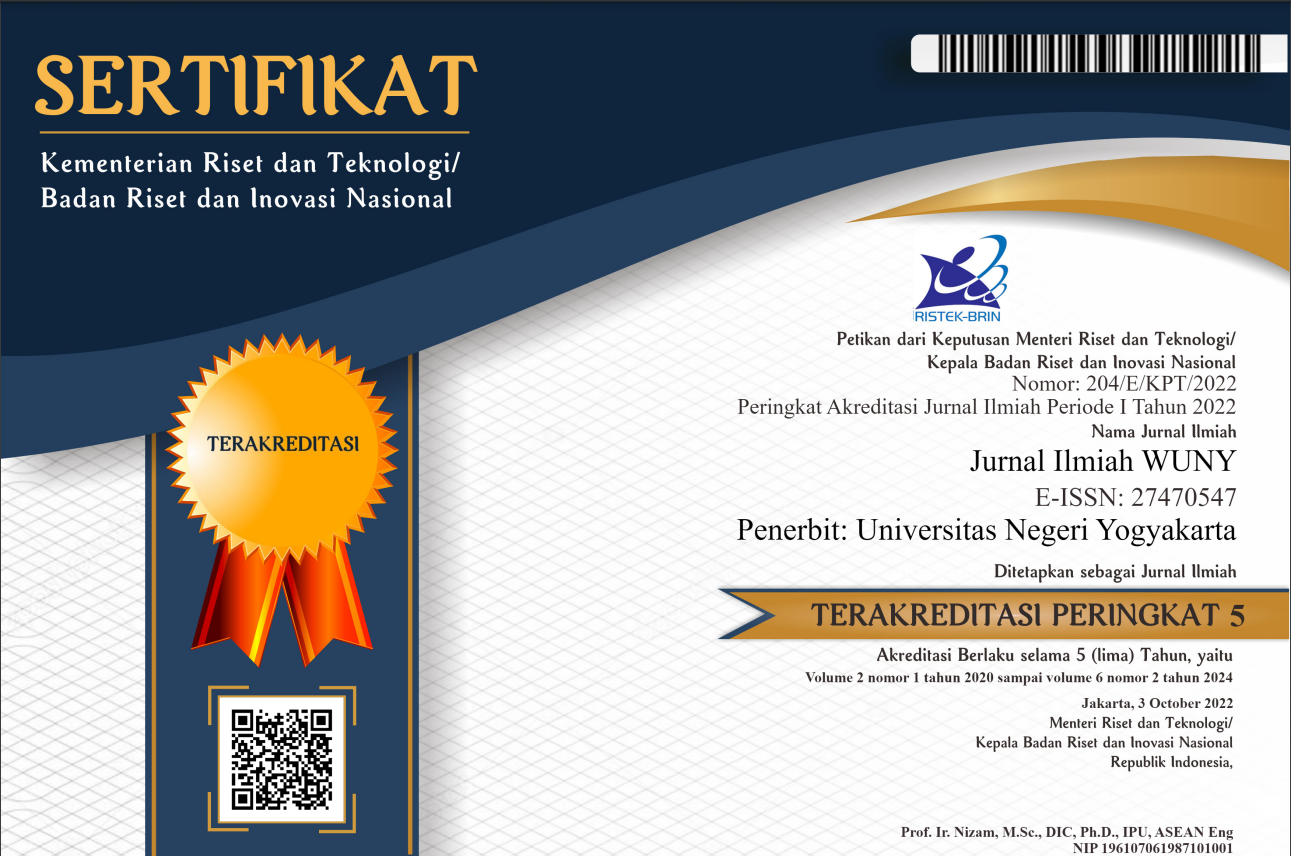The Effectiveness of Using Besmart E-Learning on the Ease of Learning for Science Education Students at UNY
Downloads
Anam, A. M., MR, M. I. F., Wiratmoko, D., Alwiyah, N., & Kurniawan, S. (2025). Kontekstualisasi Pemikiran Filsafat Pendidikan Imam Al-Ghazali dan Muhammad Abduh. Al-Isnad: Journal of Islamic Civilization History and Humanities, 6(01), 73–88. https://doi.org/10.22515/isnad.v6i01.11570
Arief S. Sadiman. dkk. (1996). Media Pendidikan: Pengertian, Pengembangan, dan. Pemanfaatannya. Jakarta: PT.Raya Grafindo Persada
Aziz, A. L., Al Musadieq, M., & Susilo, H. (2013). Pengaruh kemudahan penggunaan terhadap kemanfaatan pada sikap pengguna e-learning. Jurnal Administrasi Bisnis, 6(2).
Khuluq, M. H. H., MR, M. I. F., Widiastuti, A., & Rosardi, R. G. (2025). The Practice Of Ewuh Pakewuh Values Among University Students. Jurnal Pendidikan Ilmu Sosial, 34(1), Article 1. https://doi.org/10.17509/jpis.v34i1.81158
Liu C and Arnett KP (2000). Exploring The Factors Associated With Web Site Success In The Context Of Electronic Commerce. Information and Management 38(1), 23–33.
McKiney, V., Yoon, K., and Zahedi, Fatemeh, (2002). “The Measurement of Web-Customer Satisfaction: An Expectation and Disconfirmation Approach”, Information System Research, 13,3.
Miarso, Yusufhadi. (2004). Menyemahi Benih-Benih Teknologi Pendidikan. Jakarta: Prenada Media.
MR, M. I. F. (2025). Jejaring Makna Dalam Pendidikan Komunitas: Konstruksi Meaningrhizome Berbasis Gotong Royong Untuk Anak Pekerja Migran Di Ledokombo [Doctoral, UIN Sunan Kalijaga Yogyakarta]. https://digilib.uin-suka.ac.id/id/eprint/72794/
MR, M. I. F., Widiastuti, A., Widodo, S. F. A., Marhumah, M., & Jaya, P. H. I. (2025). Adaptive Dynamic Pattern of Alternative Educational Institution in Java, Indonesia. International Journal of Evaluation and Research in Education (IJERE), 14(5), Article 5. https://doi.org/10.11591/ijere.v14i5.33654
Nielsen J. (2000). Designing Web Usability. Indiana USA: New Riders.
Ningtyas, Y. P., Widiastuti, A., & Mr, M. I. F. (2025). Survival Strategies of Tenant Farmers: The Interconnection Between Personal Characteristics and Environmental Factors. SOCIA: Jurnal Ilmu-Ilmu Sosial, 22(1), Article 1.
Nugraheni, A. R. E., & Dina, D. (2017). Pengaruh penerapan pembelajaran e-learning terhadap kemandirian dan minat belajar mahasiswa pada mata kuliah wawasan dan kajian mipa. Edusains UIN Syarif Hidayatullah, 9(1), 111-116.
Oktarika, Dini. (2015). Pengaruh Pembelajaran Menggunakan Media E-Learning Terhadap Minat Belajar Mahasiswa Pada Mata Kuliah E-Learning Di Program Studi P.TIK. [Versi elektronik]. Jurnal Pendidikan Informatikan dan Sains, 4 (1), 15-26.
Oliver LW (1987). Research integration for psychologists: an overview of approaches. Journal of Applied Social Psychology 17(10), 860–874.
Pangestu, R. F. (2020). Pengaruh Pemanfaatan E-Learning Besmart Sebagai Media Pembelajaran Terhadap Minat Belajar Mahasiswa Teknologi Pendidikan. E-Jurnal Skripsi Program Studi Teknologi Pendidikan, 9(5), 507-517.
Parasuraman, A., (2000). Technology Readiness Index (TRI): A Multiple Item Scale to Measure Readiness to Embrace New Technologies. Journal of Service Research, 2(4), 307-320.
Pohan, A. E. (2020). Konsep pembelajaran daring berbasis pendekatan ilmiah.
Jawa Tengah: CV Sarnu Untung.
Rahayu, D. P., Himmatussa’idah, N., & MR, M. I. F. (2025). Moral Spiritual Education Through Quiet Book Media: Instilling Love for God’s Creation in Preschool Children. Darul Ilmi: Jurnal Ilmu Kependidikan Dan Keislaman, 13(1), Article 1. https://doi.org/10.24952/di.v13i1.16680
Rizal. S. & Walidain. B. (2019). Pembuatan Media Pembelajaran E-Learning Berbasis Moodle Pada Matakuliah Pengantar Aplikasi Komputer. Universitas Serambi Mekkah. Jurnal Ilmiah DIDAKTIKA: Media Ilmiah Pendidikan Dan Pengajaran, 19(2), 178-192.
Sanaky, H. A. (2013). Media pembelajaran interaktif-inovatif. Yogyakarta: Kaukaba Dipantara, 3.
Sanjaya, H. W. (2016). Media komunikasi pembelajaran. Jakarta: Kencana.
Seddon, P. B. (1997). A respecification and extension of the DeLone and McLean model of IS success. Information systems research, 8(3), 240-253.
Widiastuti, A., MR, M. I. F., Azizah, P. I., Kurniawan, S., Rohmah, Y. L., & Andjasmara, A. E. (2025). Optimalisasi Pembelajaran Berdiferensiasi Melalui Implementasi Asesmen Diagnostik Di SMP. Jurnal Wawasan Pendidikan, 5(2), 794–806.
Copyright (c) 2025 Jurnal Ilmiah WUNY

This work is licensed under a Creative Commons Attribution-ShareAlike 4.0 International License.
This work is licensed under a Creative Commons Attribution-ShareAlike 4.0 International License.



